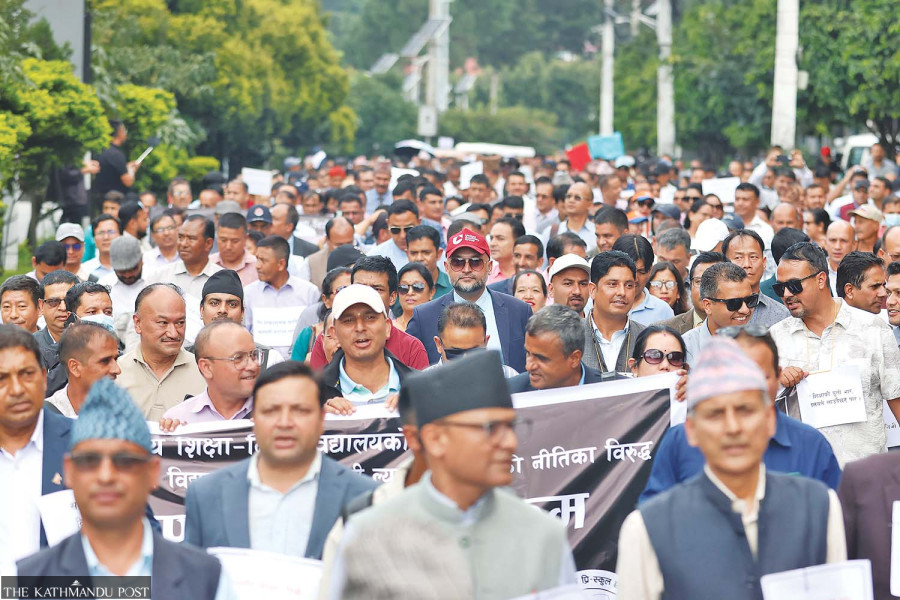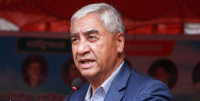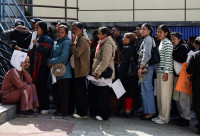National
Interest groups turn up heat on disputed School Education Bill
Private school operators are vehemently opposing proposed conversion into nonprofits. Teacher unions demand grievances over recruitment, promotion, benefits be addressed.
Post Report
The law relating to school education is a crucial legal instrument for devolving centralised education-related powers to local governments. Around ten years after the promulgation of the Constitution of Nepal, the Education, Health and Information Technology Committee of the House of Representatives approved the School Education Bill last week.
It took months of discussions and deliberations to finalise the bill, which has been presented in the lower house for endorsement. Various interest groups have heavily criticised it and even warned of street protests unless the bill is revised to address their demands.
The Nepal Teachers’ Federation, an umbrella body of school teachers, has warned of stern protests expressing reservations over various provisions in the bill. It has demanded that 75 percent of temporary teachers be made permanent through internal competition.
The bill, however, mentions that temporary teachers, including those under relief quotas, will be made permanent through a 60 percent internal competition, while 40 percent will be filled through competitive open tests.
The federation has proposed that, as per its earlier agreement with the government, the ratio should be 75 percent internal and 25 percent open competition.
The bill also provisions financial benefits and retiring teachers who fail in internal competitions. However, the federation has insisted that the amount under the “golden handshake” scheme must be specified. Ensuring periodic promotions to permanent teachers is another demand of the federation.
As per the new proposed provision, promotions would be done through internal competition, seniority combined with performance evaluation and efficiency evaluation. To qualify for promotion, a teacher must secure at least 80 marks in performance evaluation. However, the teachers want to lower the bar.
The federation has also demanded that the service period of temporary teachers should be counted when they become permanent. Teachers have expressed dissatisfaction with the idea of departmental action. They object to such authority given to the local level.
Furthermore, they have demanded that the Early Childhood Development (ECD) facilitators, who guide pre-school children, be recognised as teachers and accorded benefits accordingly. This was one of the contentious issues for the House committee to decide. As the government insisted that it did not have the funds to pay ECD facilitators equally as teachers, the committee, through a majority vote, agreed to continue them in the present state.
“We strongly object to the conspiracy to bring teachers hired by the federal government under the local level,” said Laxmi Kishor Subedi, chairperson of the federation. As envisioned in the constitution, the bill provides for local governments to manage and supervise public school teachers.
Another federation demand is that benefits and services be ensured for teachers in private schools. The bill also has a special provision that bars principals from becoming members of the teachers’ federation. However, the federation demands that principals’ trade union rights be ensured.
Private school operators, on the other hand, are also agitated, objecting to various provisions in the bills that concern them. They object to the clause that says private schools would gradually become nonprofits. Though such conversion is not binding, private school operators want it revoked.
“The government forced private schools to register under the company law. Now attempts are being made to control the schools in the name of turning them into nonprofits,” said Krishna Prasad Adhikari, chair of the Private and Boarding Schools’ Organisation, Nepal.
The institutional schools have also stood against the provision of a three percent full scholarship, including the hostel facility. On Sunday, they jointly submitted a memorandum to Speaker of the House of Representatives Devraj Ghimire and chair of the National Assembly Narayan Dahal demanding removal of those provisions from the bill.
While PABSON and other other umbrella bodies of private schools have warned of school closures, the National Private and Boarding Schools’ Association, Nepal is against it.
“We have reservations over the bill but want to resolve it through dialogue. We do not want to deprive students of their right to education,” said Pandav Hamal, chair of the National PABSAN.




 21.3°C Kathmandu
21.3°C Kathmandu













